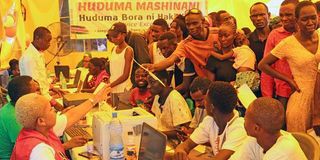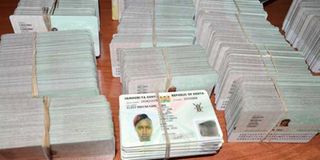
Mombasa residents turn out for a Huduma Mashinani initiative at the Kibarani Miracle Park to apply and receive Certificate of Good Conduct, Identity Cards Replacement and other Official Government Documents.
The decision by the government to do away with vetting individuals applying for national identity cards (IDs) is a relief to thousands of young people.
The worst affected were youth in border counties, especially Northern, Coast and Western Kenya, who could be denied IDs on flimsy grounds.
As a result, some Kenyans do not have the documents or use their relatives’ to register for key services. Those without IDs cannot vote.
A government agency team in Isiolo was astonished to realise that most people who registered for a workshop last week were using their relatives’ IDs.
During campaigns for the presidency in 2022, Dr William Ruto pledged to ease the getting of IDs. He has since ordered the disbandment of vetting committees. Chiefs will now endorse and approve applications.
In Garissa, the vetting panel was chaired by the assistant deputy county commissioner at the location and deputy county commissioner at sub-county level.
Mr Salat Adan, a retired chief, says the committees ensured only bona fide Kenyans got the document.
“An applicant could be interviewed to confirm his nationality and origin. We did our work thoroughly,” he said.
Ms Yasmin Abdullahi, a Garissa resident, says she had to wait for six months to acquire an ID.
“I made the application at the chief’s office. I did not encounter hurdles when being vetted because my father is a well-known teacher,” she said, adding that she only produced her parents’ original and copies of identification cards.
“I had a letter from my former school and was only asked to confirm the names of my parents and chief,” she said.
Mr Abdullahi Dahir is waiting for his ID seven months since applying. Vetting was tough for Dahir since his parents died years ago.
“I was directed to get my parents’ death certificates. The officers also told me to produce my birth certificate and come with at least two elders from my family,” he said.
Mr Adan confirms the use of family lineage in the vetting.
“We need to be sure the applicant is a resident of the area. Some people claim to be Kenyans but have no relatives here,” the retired administrator said.
The vetting panel includes assistant deputy county commissioners, chiefs and their assistants, a member of the intelligence service, a member of the Directorate of Criminal Investigations, an official of Military Intelligence and National Registration Bureau employees.
Mr Hassan Omar from Rhamu in Mandera County says vetting is tiresome and a waste of time.
“Some committee members are corrupt. Applicants with money go through the process without hurdles,” he said.
Mr Omar says he was made to face the panel twice after it was said that some information was not captured when he first faced it.
“I had to wait until the committee came to my location to be interviewed again,” he said.
Also Read: Where the invisible citizens hide
Cases of bribery have been raised, leading to vetting being suspended in Mandera East Sub-County. Residents moved to other sub counties in search of IDs.
Mandera, Wajir and Garissa residents say one can pay up to Sh250,000 to acquire an ID.
In March, Shabah Assistant Chief in Garissa, Mohamud Khaliti was arrested and charged with abuse of office and giving false information. Police linked Mr Khaliti to an ID application syndicate.
Mr Hajji Abdallah, a taxi driver in Busia, says he lost his wallet to a pickpocket in the border town in 2019. The wallet had cash, ATM cards, a driving licence and his ID.
Without the ID card, it was impossible for Mr Abdallah to renew ATM cards and the driving permit. He reported the loss and obtained a police abstract form.
Unfortunately, Mr Abdallah’s efforts have been in vain. The taxi driver believes he is being discriminated on the basis of religion and ethnicity.
The vetting by elders and government officials required him to answer many questions about his family and submit documents like his parents and grandparents’ birth certificates.
Frustration by committees
The driver has faced two vetting panels. The committees also asked him for documents bearing the number of his lost ID card.
“Despite banks and the National Transport and Safety Authority (NTSA) having my details, I have not got a replacement ID. They keep taking me in circles,” he said.
Mr Abdallah filled the application form and had fingerprints taken by the National Registration Bureau.
“I wonder why other Kenyans acquire IDs without being ordered to produce these many documents and being subjected to humiliating questions. Five years down the line, I am still waiting for the document,” he said.
He now lives like a foreigner in Kenya, unable to find work. Even getting menial jobs is a herculian task as some bosses insist on one having an ID.
Mr Abdallah cannot access his bank savings or receive mobile money.
According to Busia Township Chief Oscar Okello, any young person applying for an ID card must be presented by a parent or close relative.
“The parent or guardian will have to produce a document of proof before we start the process,” Mr Okello told the Sunday Nation.
Chiefs are expected to work closely with security agencies in ensuring fair issuing of ID cards while safeguarding national interests and the integrity of the registration.
Sheikh Abubakar Abdallah of Imam Mnazini mosque says discrimination is rampant when it comes to issuing the documents.
Residents of areas near the Somalia border in Lamu County are unhappy, some feeling ostracised.
They complain of frustration by vetting committees before getting the important document.
For some, the waiting card is what they have to show, years after applying for IDs.

Uncollected ID cards. Interior ministry plans to issue digital identity cards with special features and personal details.
Those interviewed complained of being treated like second-class citizens, citing delays in getting the document or outright denial by the vetting teams.
The most affected areas are Kiunga, Ishakani, Madina, Boni forest and Witu on the Lamu-Tana River counties border.
The situation in the areas is so dire that even getting birth notification documents is a Herculean task.
Many children born in Boni do not have birth certificates.
“There are no hospitals here, resulting in many home births. We have no notifications to enable us get birth certificates. It is very frustrating when one begins looking for an ID card. The vetting is tiresome,” former Boni Forest Senior Chief Yusuf Nuri said.
Kiunga resident Ali Islam says he has waited for his ID card for two years despite been vetted, registered and being given a waiting card.
“I was born and raised here. I applied for the ID in 2019. I was given a waiting card in 2020 but since then, I haven’t received the ID,” the 22-year-old said.
It’s a similar story with 21-year-old Khadija Mahazi, a resident of Kiangwe.
She says she applied for an ID in 2022, went through “tiresome” vetting but is yet to get the critical card.
The residents, however, are happy with the new system that involves chiefs in the registration and issuing of IDs.
“Chiefs are best suited for the duty. They know almost everyone and their background in their areas of jurisdiction,” said Abdalla Bakari, an Ishakani local.
“We expect that the vetting will not be strenuous any more. Chiefs live among us.”.
In Nyanza, Suba residents have had to go an extra mile when applying for IDs.
Many are vetted, with some being ordered to attach affidavits from their parents on the application forms.
The process would involve sitting before a committee whose members would ask random questions, mostly related to the community.
The questions are meant to tell if the applicant truly belongs to the community or if he or she happens to be a foreigner.
Government authorities in Suba say the vetting helps identify non-Kenyans.
According to the officials, the proximity of the region to Tanzania makes it easy for a non-natives to apply for Kenyan identity documents.
Mfangano North Chief Bernard Ochieng, who was a member of the local vetting committee, says applicants would ordinarily be asked questions on their family backgrounds.
Involving village elders enabled the committee members to pinpoint the exact home of the applicant as senior citizens are the eyes of the government at village level.
Mr Ochieng says they would also ask an applicant to speak the local language .
His Kaksingri East colleague, Daniel Magadi, says the committee he sat in would meet at least two times a month.
Mr Magadi, however, adds that more meetings would be held at the end of the year when Form Four students complete national examinations and want to move to the next level of education.
“I only append my signature as approval on application forms once an individual is cleared by the vetting committee,” the chief said.
Reported by Manasse Otsialo, Shaban Makokha, Kalume Kazungu and George Odiwuor








